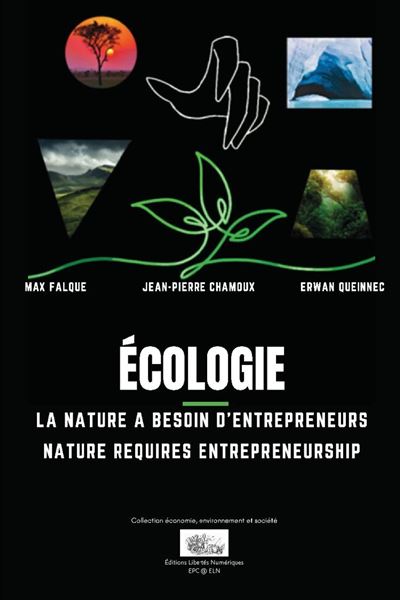ICREI publishes an important book on the role of the entrepreneur for the environment.
This publication more specifically addresses the French speaking readers. As for the English speaking ones, we assume that most of what is said hereafter is quite familiar to them. We hence suggest that those who are not too familiar with the French language may as well jump to any of the following chapters and to the two appendixes where lies the most significant content of this book, either originally drafted in English or abstracted in this language.
The inventive auxiliary of ecology
The first part of this book delivers an optimistic message based on numerous concrete cases All over the world, enterprising people are maintaining nature and restore the environment with their own strength, without having to resort to either public force or coercion. These examples concern biodiversity, the preservation of species and the wise exploitation of the environment.
The second part shows that property rights stimulate the efficient use of resources and the and the development of nature. These chapters also emphasize that nature can benefit as much as humans!
The third part of the book deals with economic and political science issues: associated with human activity, negative externalities are rarely incurable.
Market-based recovery, recycling and environmental restoration support the environment as much as and restoration of the environment support as the coercion and sanctions that public action generally favors!
The final chapters look at the political, economic and industrial conditions that that stimulate initiative, innovation, and efficiency in environmental and environmental enterprises. to the environment and the exploitation of natural resources. The pragmatic law of industry is to produce “always more
with less.”
After three centuries of centuries of economic development, the conditions of life on Earth have improved greatly thanks to the products of this industry. When closing this book, the reader will also notice that, when the political conditions lend themselves to it, the private initiative, altruistic as well as commercial, can manage the natural environment as well as and sometimes better than public constraint taxes and regulation. Not being suicidal, the entrepreneurs are not opposed to ecology. On the contrary, they can be the discreet and inventive auxiliary of it ; still it is necessary to encourage them to act!
This book brings together some twenty contributions written in English or French. It is based on It is based on an important empirical corpus covering North America, Africa and Europe.
About twenty original contributions
Part 1. Evidence and case studies
- Environmental entrepreneurship: case studies of common pools with the Ostroms 🇺🇸
John Baden (Free Foundation, Montana) - Opportunities for the Environmental Entrepreneur 🇺🇸
Lain Murray (Competitive Enterprise Institute, Washington D.C.) - Entrepreneurship and the Environmental Discovery Process 🇺🇸
Paul Schwennesen (Agrarian Freedom Project) - Agricultural Land: Management in common, from concepts to implementation 🇺🇸
Sjoerd Wartena (Terre de Liens) - The underwater enviropreneur 🇺🇸
Reed Watson (PERC Institute, Montana)
Part 2. Legal issues
- Protecting non-material environmental resources 🇫🇷
Pierre-Dominique Cervetti (Avocat et Professeur de Droit, AixMarseille Université) - Stimulating Private Land Conservation Entrepreneurship 🇫🇷
Thierry de l’Escaille (European Landowners’ Organisation) - Property rights and environmental management in Africa 🇫🇷
Robinson Tchapmegni (Professeur de droit, Québec)
Part 3. Economics and political science
- North Africa, Middle East: environment, growth and green entrepreneurship 🇫🇷
Antoine-Tristan Mocilnikar (Ministère de l’Environnement, France) - Incentives or market failure : diverging policies on waste management 🇫🇷
Pierre Desrochers et Erwan Queinnec (Universités de Paris et Toronto) - Green entrepreneurship for innovation and growth: what can governments do ? 🇫🇷
Lucia Cusmano (OCDE) - Cleantech start-up development 🇫🇷
David Dornbusch (CleanTusday) - Greening: thanks to entrepreneurship or politics ? 🇫🇷
François Facchini & Benjamin Michallet - Institutions and environmental entrepreneurship 🇫🇷
Max Falque (ICREI)
Part 4. Doctrine
- Are eco-enterprises different? 🇫🇷
Michel Debruyne (Université de Lille) - Enterprises and sustainable development : beyond first sight 🇫🇷
Dominique Bidou (Consultant) - Incentives, checks and balances for a circular economy 🇫🇷
Yvette Lazzeri (Aix Marseille Université – CERIC) - Ecology and entrepreneurship in the US and France 🇫🇷
Michel Marchesnay (Université de Montpellier)
Max Falque (dir.), Jean-Pierre Chamoux (dir.), Erwan Queinnec (dir.), Écologie, La nature a besoin d’entrepreneurs – Nature requires entrepreneurship, éditions Libertés numériques, 2021.
Both digital version and hard copies are available on Amazon.
